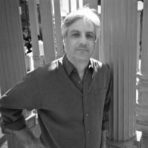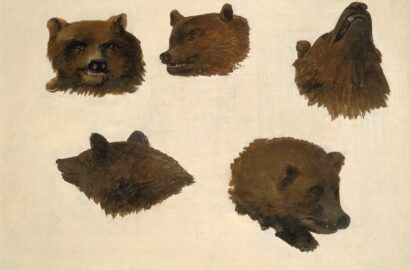On a weekday afternoon in early March, I found myself on Amtrak, traveling from Washington, D.C. to New York. The first time I took this route, I was not quite sixteen, a wanna-Beat reading The Dharma Bums to the soundtrack laid down by the rhythm of the rails. I kept imagining that motion as something spiritual… but then, I have long had a thing for trains. Three years later, I would nearly be killed by one while crossing a freight trestle bridge with a friend just outside the South Texas town of Three Rivers, where we were then on crew at a uranium mine.
Run! I screamed or might have screamed or thought I screamed as I saw the snout of the locomotive round a stand of cottonwoods, and we were off, trying not to look at the gaps between the trackless ties or the dry riverbed twenty feet below us, trying not to slip and fall, or more accurately: trying not to die.
To say that, as a culture, we now face a similar predicament is both cliché and understatement. But then, this is where we are. I kept seeing reminders of that when I was in Washington. The first morning, on a tour of the White House, I was struck, not unhappily, by the absence of any residue or recollection of a certain former president, as if he had been erased. This, however, is wishful thinking, if it can be said to be thinking at all. Even as we wandered the District, visiting the National Museum of African American History and Culture and the National Gallery, I couldn’t help but think about how tenuous everything has become. Two days before our arrival, that same ex-chief executive effectively clinched the Republican nomination for president; if this had been a foregone conclusion, it was no less troubling for being so.
Standing in those museums, I felt suspended between what seemed opposing polarities—on the one hand, the sustaining power of community, perseverance, aspiration, and expression; on the other, what an exhibit on German Expressionism referred to, without irony, as The Anxious Eye. “If suffering can be transformed into creativity … I want to try it,” read a statement by Ernst Ludwig Kirschner showcased at the entrance. Behind it, dozens of paintings, etchings, and artist books recalled a period of pandemic, economic upheaval, political turmoil, the rise of fascism and extremism; a time that so eerily reflects our own I hesitate to draw attention to it for fear of all the fates and furies I might possibly invoke.
And yet, if The Anxious Eye has anything to tell us, it’s that we can’t give up. We must stare the present—and the past and the future—full in the face and record it for what it is. We cannot give into despair or false narratives; we cannot look away. This is the real spiritual—as well as intellectual and aesthetic—necessity.
We must not only bear witness but also engage.
That’s what we hope to do with this issue of Air/Light. Here, you’ll find the mix of essays, fiction, and poetry to which we hope you’ve grown accustomed. Here, you’ll find the voices and the conversations, the visions and responses, the faith that art and literature must be an active force. Such a spirit infuses our interview with Maxine Hong Kingston, recorded last fall at Bovard Auditorium as part of the Chowdhury Distinguished Speakers Series, as well as our package “Gaza Diaries,” co-published with We Are Not Numbers, an organization that showcases the writing of young Palestinians. Such a spirit sits at the center of Magdaléna Platzová’s “Life After Kafka,” which imagines, in part, the later years of Kafka’s fiancée Felice Bauer, who lived for a time in Los Angeles after the Second World War.
I am writing these notes in a time that confounds and terrifies. But then, I am reminded, it was ever thus. The future is never known, is never present. All we have is the moment in which we live. How to respond, how to address it—these are the questions that define us. These are the fundamental inquiries.


